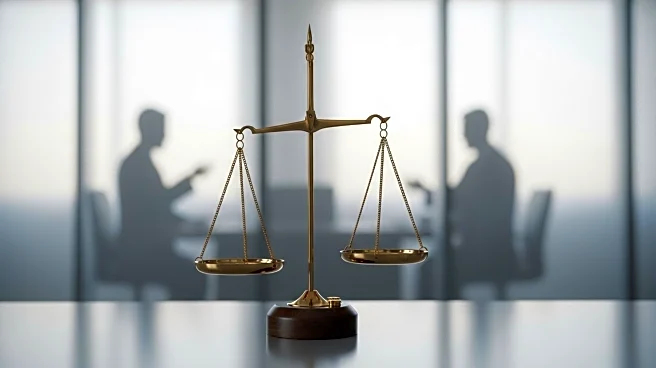What's Happening?
The national security trial of Jimmy Lai, a prominent pro-democracy media tycoon in Hong Kong, has reached its conclusion with final arguments presented. Lai, who has been imprisoned since 2020, faces charges under Hong Kong's national security law and a colonial-era sedition law. The charges include conspiracy to collude with foreign forces and conspiracy to publish seditious material. The trial, which has been closely watched internationally, is seen as a significant test of Hong Kong's legal system and its rule of law. Lai's defense team argued that the prosecution failed to provide sufficient evidence of conspiracy, while the prosecution accused Lai of using his media outlet, Apple Daily, to lobby for foreign sanctions against Chinese and Hong Kong authorities. The trial has been presided over by government-appointed judges, a departure from Hong Kong's common law system, which typically involves a jury.
Why It's Important?
The trial of Jimmy Lai is pivotal in understanding the broader implications of Hong Kong's national security law, which has been criticized for stifling dissent and freedom of expression. Lai's case highlights the tension between pro-democracy movements and Beijing's increasing control over Hong Kong. The outcome of this trial could set a precedent for future cases under the national security law, impacting media freedom and civil liberties in the region. International observers and human rights groups have expressed concern over the trial's fairness, particularly regarding the exclusion of Lai's chosen legal representation. The verdict could influence Hong Kong's relationship with foreign governments and its standing in the global community, as it reflects the city's commitment to upholding democratic principles and human rights.
What's Next?
The judges are expected to announce their verdict 'in good time,' which could result in a life sentence for Lai if convicted. The decision will likely provoke reactions from international human rights organizations and foreign governments, potentially leading to diplomatic tensions. The trial's outcome may also affect the future of pro-democracy activism in Hong Kong, as it could either embolden or deter activists depending on the verdict. Additionally, the closure of Apple Daily and the prosecution of its executives have already impacted media operations in Hong Kong, and further legal actions could continue to reshape the media landscape.
Beyond the Headlines
The trial underscores the ethical and legal challenges faced by Hong Kong's judicial system under the national security law. It raises questions about the balance between national security and individual rights, as well as the role of media in political discourse. The case also highlights the cultural shift in Hong Kong as it navigates its identity amidst increasing influence from Beijing. Long-term implications may include changes in public perception of the legal system and the potential for increased self-censorship among media outlets and activists.









